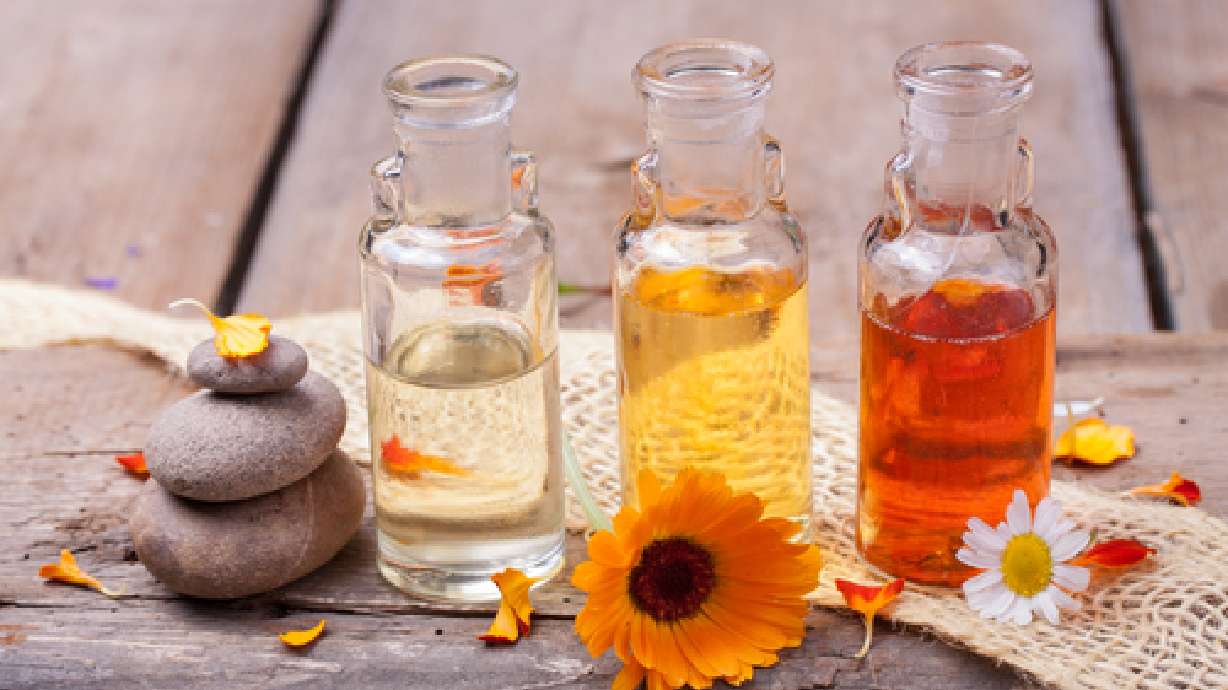Estimated read time: 4-5 minutes
This archived news story is available only for your personal, non-commercial use. Information in the story may be outdated or superseded by additional information. Reading or replaying the story in its archived form does not constitute a republication of the story.
You may have plants you are not even using! There are a ton of things that you can do with all those fruits and veggies that your garden is producing right now, but what about all those fragrant flowers and herbs? I find they are the most often overlooked when it comes to storing leftovers from the garden.
Buying essential oils is often very expensive. Alternatively, making homemade essential oils can be very cost effective, no matter what you want to use them for. Essential oils are incorporated into homemade household products where they are used to "flavor" (if you will) things you use every day. Scented soaps, cleaners, dish washer and laundry detergents, shampoo, conditioners, and deodorant all have an essence in them. They are used in lotions and candles.
Another use- specifically for essential infused oils- is cooking. Basil, rosemary and thyme are often included in salad dressings, sauces, and stir-fries. They can be put into lip balm, toothpaste, and teas. Never use a store bought essential oil in cooking- unless it notes that it is safe to ingest.
Essential oils are additionally used as healing ointments and as aromatherapy treatments. If you are looking to use essential oils medicinally, plants have various qualities. Dandelion root, for example, reportedly cleanses and supports the liver, kidneys and spleen. It may also improve digestion and help flush toxins from the body. Dandelion leaves are also reportedly used as a weight loss aid. Another herb, Echinacea, is good for common cold and to calm the nerves. It was also commonly used by Native Americans to treat infections and wounds. Rosemary oil combats mental fatigue, increasing concentration and memory. Basil can help soothe a wasp sting.
For more information on plants with medicinal uses, Back to Eden by Jethro Kloss is a good, inexpensive all inclusive book. "The Secrets of Successful Herb Gardening" by Adam Gilpin is another good one.
Making Infused Essential Oils
There are several different ways to make essential aromatic oils and several different uses. This is all you will need for the simple process of infusing:
• Your choice carrier oil
• Your choice fragrant stock
• A jar with a lid
• A strainer (cheese cloth works well)
This method consists of a process called infusing. This requires combining a carrier oil and your chosen plant essence, and is safe to injest. The best oils for this process are mild and don't have an overpowering flavor or smell to them such as sunflower oil. Olive (not extra-virgin), safflower, grape seed, and almond oils are also good options. Even canola and other vegetable oils will suffice.
Pick your stock plant. Lavender is one of the most common essential oils- used for relaxation- but citrus peals (orange, lemon, lime), rose petals, pines, mints and herbs (basil, dill seed, rosemary) work well. You can use any plant, flower or herb with a fragrance that you enjoy!
Harvest before the heat of the day sets in, before plants have spent their energy for the day. Be gentle while pruning to not diminish the quality of the herbal essences. Annual herb leaves can be harvested throughout the season, perennial herbs should be harvested near the end of September. Flowers should be in full bloom immediately before the preservation process and should not be washed. Seeds can be used after they turn brown and are ready to fall off their dead flowers. If you are using citrus, make sure that you only use the outer flesh. Do not use the white pith.
Once you have selected your stock, place it into a jar and fully cover the stock with oil. Seal the jar with a lid and leave in a dry area out of the sun for up to a week. Strain and press flowers to release more oil. At this point, after removing the old stock, you can add more fresh stock to your oil and repeat the last two steps for added scent strength. You can also mix in other plants to create unique scents. When satisfied with the infused oil, remove all plant material before storing. Otherwise your oils will turn cloudy and become sour. Homemade infused essential oils should have a shelf life of up to two years but are best used within the first.
Alternative ways to make essential oils includes boiling your carrier oil and essence together for 4-5 hours to get quicker results, but your product may not last as long or be as potent. Another option, if you just like the smell, is to make perfumes. To do this you'll use a non-denatured ethyl alcohol - this type of alcohol has not been made undrinkable - or vodka instead of a carrier oil. The process is the same as making essential aromatic oils. If you wish to separate the oil from the alcohol later- you can freeze the mixture. The natural oils will then separate and rise to the top.
If you are making large batches of aromatic oil, and don't mind investing a little more money you'll want to get a steam-water distiller. The process of distilling will make your oils more pure as no carrier oil is required, you'll be able to make larger batches, and they will keep for much longer (up to 10 years). A distiller will usually cost a couple hundred dollars, but will last for a long time.









